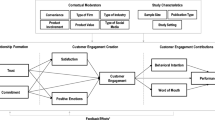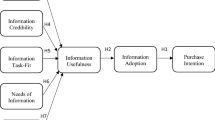Abstract
Our study offers a novel approach to investigating whether and when culturally customized websites are an effective way to influence consumers in their online purchase decisions. In particular, informed by extant studies on metacognitive experiences and processing fluency, we examine the underlying mechanism whereby increased cultural congruence derived from a culturally customized website may influence the subjective experience and increase willingness to pay (WTP) online. In order to address these issues, we have conducted two empirical studies that (1) identify cultural differences between the websites of Korean and U.S. travel agencies and (2) investigate the influence of culturally customized websites on WTP in these two markets. The results show that the cultural dimension of uncertainty avoidance is associated significantly with processing fluency, which mediates the consumers’ WTP. In particular, culturally customized websites are more likely to be effective for Korean consumers who have high uncertainty avoidance compared with U.S. consumers who have low uncertainty avoidance. We found that when Korean consumers experience cultural incongruence, they feel a need to exert increased effort in order to process information, which mediates their WTP. However, cultural congruence does not have a significant effect on U.S. consumer WTP. The study has important implications for both academics and managers when developing and employing culturally customized websites to communicate with their consumers.


Similar content being viewed by others
References
Aaker, J., & Schmitt, B. (2001). Culture-dependent assimilation and differentiation of the self: preferences for consumption symbols in the United States and China. Journal of Cross-Cultural Psychology, 32(5), 561–576.
Alter, A. L., & Oppenheimer, D. M. (2009). Uniting the tribes of fluency to form a metacognitive nation. Personality and Social Psychology Review, 13(3), 219–235.
Baack, D. W., & Singh, N. (2007). Culture and web communications. Journal of Business Research, 60(3), 181–188.
Bartikowski, B., & Singh, N. (2014). Should all firms adapt websites to international audiences? Journal of Business Research, 67(3), 246–252.
Bruner, G., & Kumar, A. (2005). Explaining consumer acceptance of handheld Internet devices. Journal of Business Research, 58(5), 115–120.
Chang, H., & Chen, S. (2008). The impact of online store environment cues on purchase intention: trust and perceived risk as a mediator. Online Information Review, 32(6), 818–841.
Hoffman, D., & Novak, T. (1996). Marketing in hypermedia computer-mediated environments: conceptual foundations. Journal of Marketing, 60(3), 50–68.
Hofstede, G. (1984). Cultural dimensions in management and planning. Asia Pacific Journal of Management, 1(2), 81–99.
Hofstede, G., & Hofstede, G. V. (2004). Cultures and organizations: software for the mind. New York: McGraw-Hill.
Markus, H. R., & Kitayama, S. (1991). Culture and the self: implications for cognition, emotion, and motivation. Psychological Review, 98(2), 224–253.
Raudenbush, S. W., & Bryk, A. S. (2002). Hierarchical linear models. Newbury Park, CA: Sage.
Reber, R., Schwarz, N., & Winkielman, P. (2004). Processing fluency and aesthetic pleasure: is beauty in the perceiver’s processing experience? Personality and Social Psychology Review, 8(4), 364–382.
Ruan, D., Chen, G., Kerre, E. E., & Wets, G. (2005). Intelligent data mining. Heideberg: Springer.
Schwarz, N. (2004). Metacognitive experiences in consumer and decision making. Journal of Consumer Psychology, 14(3), 332–348.
Seo, Y., & Gao, H. (2014). Towards a value-based perspective of consumer multicultural orientation. European Management Journal. doi:10.1016/j.emj.2014.06.001.
Singh, N., & Matsuo, H. (2004). Measuring cultural adaptation on the Web: a content analytic study of US and Japanese Web sites. Journal of Business Research, 57(8), 864–872.
Song, H., & Schwarz, N. (2008). If it’s hard to read, it’s hard to do. Psychological Science, 19(10), 986–988.
Song, H., & Schwarz, N. (2009). If it’s difficult to pronounce, it must be risky fluency, familiarity, and risk perception. Psychological Science, 20(2), 135–138.
Thompson, D. V., & Hamilton, R. W. (2006). The effects of information processing mode on consumers’ responses to comparative advertising. Journal of Consumer Research, 32(4), 530–540.
Wang, X., Cui, T., & Teo, H. (2014). A cross-cultural study of intrusiveness and fluency effects of web ads. PACIS 2014 Proceedings, Paper 306. http://aisel.aisnet.org/cgi/viewcontent.cgi?article=1081&context=pacis2014.
Wigder, Z. D., Miglani, J., Kawashiwagi, M., & Katz, R. (2013). Asia pacific online retail forecast 2013 to 2018. Cambridge: Forrester Research.
Yang, C.C., & Kang, Y. (2002). The influence of cultural factors on consumers’ reaction to internet advertisements. Developments in Marketing Science: Proceedings of the Academy of Marketing Science, 25, 148–151.
Yoo, B., & Donthu, N. (2002). The effects of marketing education and individual cultural values on marketing ethics of students. Journal of Marketing Education, 24(2), 92–103.
Author information
Authors and Affiliations
Corresponding author
Additional information
This work was partially supported by Hankuk University of Foreign Studies Research Fund
Rights and permissions
About this article
Cite this article
Ko, D., Seo, Y. & Jung, SU. Examining the effect of cultural congruence, processing fluency, and uncertainty avoidance in online purchase decisions in the U.S. and Korea. Mark Lett 26, 377–390 (2015). https://doi.org/10.1007/s11002-015-9351-4
Published:
Issue Date:
DOI: https://doi.org/10.1007/s11002-015-9351-4




